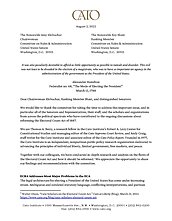It was also peculiarly desirable to afford as little opportunity as possible to tumult and disorder. This evil was not least to be dreaded in the election of a magistrate, who was to have so important an agency in the administration of the government as the President of the United States.
Dear Chairwoman Klobuchar, Ranking Member Blunt, and distinguished Senators:
We would like to thank the committee for taking the time to address this important issue, and in particular all of the Senators and Representatives, their staff, and the scholars and organizations from across the political spectrum who have contributed to the ongoing discussions about reforming the Electoral Count Act of 1887.
We are Thomas A. Berry, a research fellow in the Cato Institute’s Robert A. Levy Center for Constitutional Studies and managing editor of the Cato Supreme Court Review, and Andy Craig, staff writer for the Cato Institute and associate editor of the Cato Policy Report. Founded in 1977, the Cato Institute is an independent, nonpartisan public policy research organization dedicated to advancing the principles of individual liberty, limited government, free markets, and peace.
Together with our colleagues, we have conducted in-depth research and analysis on the flaws of the Electoral Count Act and how it should be reformed. We appreciate the opportunity to share our findings and recommendations with the committee.
ECRA Addresses Most Major Problems in the ECA
The legal architecture for electing a President of the United States has come under increasing strain. Ambiguous and outdated statutory language, conflicting interpretations, and partisan pressures have combined to threaten the American people with presidential elections devolving into a quadrennial constitutional crisis.
This is unacceptable, and the draft Electoral Count Reform Act (ECRA) proposal from Sen. Collins, Sen. Manchin, and their colleagues in the bipartisan working group is a well-crafted starting point for fixing this problem. It reflects many of the ideas we and others have urged Congress to adopt. As it stands, the ECRA draft would be an immense improvement over the status quo and substantially reduce the risks of another disputed election.
The ECRA draft’s reforms include: requiring states to set all of their election procedures by laws enacted prior to Election Day; an expedited judicial backstop to handle the risk of rogue actors obstructing the certification of electors; replacing the muddled “safe harbor” and “failed elections” sections of current law with clearer rules; a firmer commitment to respect the timely outcome of the state law process for appointing electors, including applicable court rulings; raising the number of cosponsors needed for congressional objections; reorganizing the notoriously confusing rules for the joint session in 3 USC §15; and a categorical repudiation of claims that the Vice President has any unilateral power over the electoral count.
To read the full Statement for the Record, download the PDF below.

This work is licensed under a Creative Commons Attribution-NonCommercial-ShareAlike 4.0 International License.


